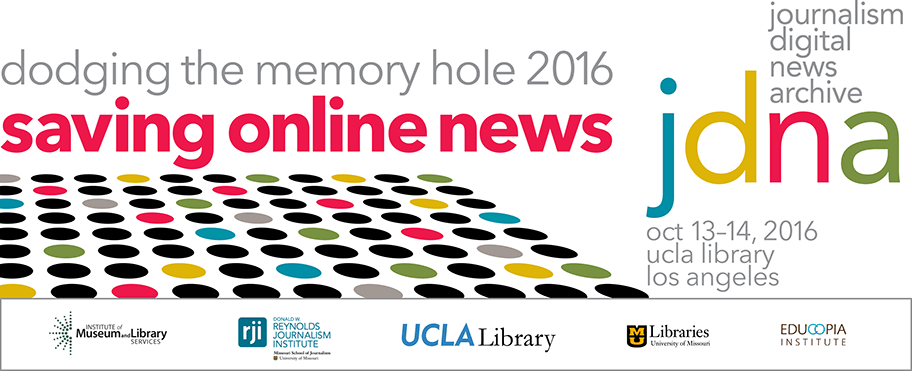
White paper: Two days dedicated to Dodging the Memory Hole
This white paper summarizes the Dodging the Memory Hole 2016: Saving online news event, with overviews of the panels and presentations, and projects produced by groups at the conference as well as student scholarship recipients.
On Oct. 13–14, 2016, University of Missouri Libraries, in collaboration with the Donald W. Reynolds Journalism Institute, UCLA Library and the Educopia Institute, hosted Dodging the Memory Hole 2016: Saving online news at UCLA. The national forum was the fifth event in the DTMH series, which bring together stakeholders to address the theory and practice of born-digital news preservation. The goals of DTMH 2016 included the following:
- Produce and publish an outline for a proposed national agenda for preserving online born-digital news;
- Identify concrete roles for each stakeholder required to accomplish this agenda;
- Facilitate cooperation and knowledge sharing between news technologists and digital preservation experts;
- Examine
how technology platforms such as content management systems (CMSs) can
be adapted to work with existing digital preservation infrastructure; - Better
prepare students, especially those in library science, archival and
museum studies, and information sciences, for the digital preservation
needs of 21st Century journalism; - Identify specific projects that will advance online preservation practice today.
This white paper summarizes the Dodging the Memory Hole 2016: Saving online news event, with overviews of the panels and presentations, details regarding the national agenda, projects produced by groups at the conference as well as projects produced by student scholarship recipients. The paper also outlines impact evaluation of the conference and an action agenda to facilitate work in the future.
Highlights of DTMH 2016 included speakers such as Pulitzer Prize-winning journalist Peter Arnett; keynote speaker and data expert Hjalmar Gislason from Qlik; Clifford Lynch, executive director of the Coalition for Networked Information; computer science professor Michael Nelson from Old Dominion University; Tim Groeling, chair of the department of communication studies at UCLA; Kate Zwaard, chief of National Digital Initiatives at the Library of Congress and Katherine Skinner, executive director of the Educopia Institute.
Expert panels included The New York Times Technology Team sharing the cutting-edge work they have been doing with the “TimesMachine” virtual microfilm reader and other aspects of the newspaper’s digital output. Another panel, titled “Kiss Your App Goodbye: The Fragility of Data Journalism,” explored the technical issues related to working with special kinds of news products that often end up outside of conventional Content Management Systems. “Why save online news?” panelists explored some of the critical issues surrounding journalistic information in today’s ephemeral digital environment.
The 2016 participants broke into small groups and engaged in structured work sessions to advance the six action areas identified and prioritized during the DTMH 2014 forum: Awareness, legal framework, policy, resources, standards and practices and technology. The same groups were tasked with formulating fundable project proposals that would advance the DTMH agenda to save online news.
The inclusion of 14 graduate students from a wide range of disciplines was new to this iteration of the DMTH series and provided new interest and energy to the conference conversations. The students produced projects in support of conference goals, a step in the direction of educating the next generation of stewards for online news content.
The white paper also includes an evaluation of the impact of the DTMH 2016 forum on participants. Surveys conducted immediately before and after the event provide insights into the kinds of stakeholder who attended. Those surveyed indicated that the event had a generally positive effect on their knowledge about the issues involved in preservation of journalism online and their ability to promote and support efforts to save it.
The Dodging the Memory Hole 2016: Saving online news forum was made possible, in part, by the Laura Bush 21st Century Librarian Program from the Institute of Museum and Library Services (IMLS), grant #RE-33-16-0107-16. Additional funding was provided by the Donald W. Reynolds Journalism Institute. Principal Investigator for the IMLS grant was Edward McCain, digital curator of journalism at RJI. Co-PIs included Peter Broadwell, academic project developer at UCLA; Sharon Farb, associate university librarian at UCLA; Todd Grappone, associate university librarian at UCLA; and Katherine Skinner, executive director at the Educopia Institute.
